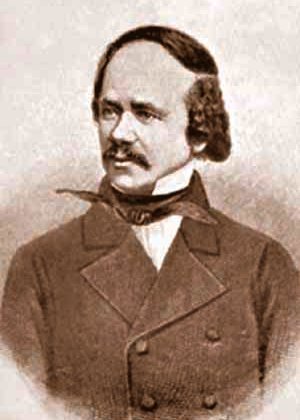Modest Mussorgsky
Modest Petrovich Mussorgsky (21 March 1839 – 28 March 1881) was a Russian composer, one of the group known as "The Five" or "The Mighty Handful", a circle of composers who sought to produce a specifically Russian kind of art music. Mussorgsky was born in Karevo, Russia, and grew up in a wealthy land-owning family. Despite his family's efforts to steer him towards a career in the military, Mussorgsky developed a passion for music at an early age and eventually chose to pursue it as his life's work.
Biography[edit | edit source]
Early Life[edit | edit source]
Mussorgsky showed musical promise from an early age, but his family intended him for a military career. He began piano lessons with his mother at the age of six and quickly showed remarkable talent. By the age of ten, he was capable of performing advanced works. Despite this early promise, his formal musical education was sporadic, and he largely taught himself by studying the works of others.
Career[edit | edit source]
In 1856, Mussorgsky joined the Preobrazhensky Regiment of the Imperial Guard, but his military service did not quench his interest in music. It was during this time that he met Alexander Borodin, another member of The Five, and began to seriously pursue a career in music. Mussorgsky's compositions often drew on Russian history and folklore, and he strived to produce a distinctively Russian musical identity. His works include the opera Boris Godunov, the orchestral tone poem Night on Bald Mountain, and the piano suite Pictures at an Exhibition, which was later famously orchestrated by Maurice Ravel.
Later Years and Death[edit | edit source]
Mussorgsky's later years were marked by personal struggles, including alcoholism, which contributed to his declining health. Despite these challenges, he continued to compose, although his output slowed. Mussorgsky died in 1881 at the age of 42. His works were edited and promoted after his death by his friends, including Nikolai Rimsky-Korsakov, which helped to secure his legacy.
Musical Style and Influence[edit | edit source]
Mussorgsky's music is known for its innovation, rich harmonies, and rhythmic complexity. He often employed Russian folk melodies and themes from Russian history, making his compositions distinctly nationalistic in character. His opera Boris Godunov is considered one of the masterpieces of Russian opera, notable for its portrayal of historical characters and use of the Russian language.
Mussorgsky's influence extends beyond Russia, impacting many composers who sought to incorporate national elements into their music. His work has been seen as a bridge between traditional Russian music and the more modernist approaches of the 20th century.
Legacy[edit | edit source]
Today, Mussorgsky is celebrated as one of the most important Russian composers. His works are regularly performed worldwide, and he is remembered for his contribution to the development of a distinctly Russian style of classical music. His innovative approach to composition and orchestration has inspired generations of composers.
Search WikiMD
Ad.Tired of being Overweight? Try W8MD's physician weight loss program.
Semaglutide (Ozempic / Wegovy and Tirzepatide (Mounjaro / Zepbound) available.
Advertise on WikiMD
|
WikiMD's Wellness Encyclopedia |
| Let Food Be Thy Medicine Medicine Thy Food - Hippocrates |
Translate this page: - East Asian
中文,
日本,
한국어,
South Asian
हिन्दी,
தமிழ்,
తెలుగు,
Urdu,
ಕನ್ನಡ,
Southeast Asian
Indonesian,
Vietnamese,
Thai,
မြန်မာဘာသာ,
বাংলা
European
español,
Deutsch,
français,
Greek,
português do Brasil,
polski,
română,
русский,
Nederlands,
norsk,
svenska,
suomi,
Italian
Middle Eastern & African
عربى,
Turkish,
Persian,
Hebrew,
Afrikaans,
isiZulu,
Kiswahili,
Other
Bulgarian,
Hungarian,
Czech,
Swedish,
മലയാളം,
मराठी,
ਪੰਜਾਬੀ,
ગુજરાતી,
Portuguese,
Ukrainian
Medical Disclaimer: WikiMD is not a substitute for professional medical advice. The information on WikiMD is provided as an information resource only, may be incorrect, outdated or misleading, and is not to be used or relied on for any diagnostic or treatment purposes. Please consult your health care provider before making any healthcare decisions or for guidance about a specific medical condition. WikiMD expressly disclaims responsibility, and shall have no liability, for any damages, loss, injury, or liability whatsoever suffered as a result of your reliance on the information contained in this site. By visiting this site you agree to the foregoing terms and conditions, which may from time to time be changed or supplemented by WikiMD. If you do not agree to the foregoing terms and conditions, you should not enter or use this site. See full disclaimer.
Credits:Most images are courtesy of Wikimedia commons, and templates, categories Wikipedia, licensed under CC BY SA or similar.
Contributors: Prab R. Tumpati, MD




